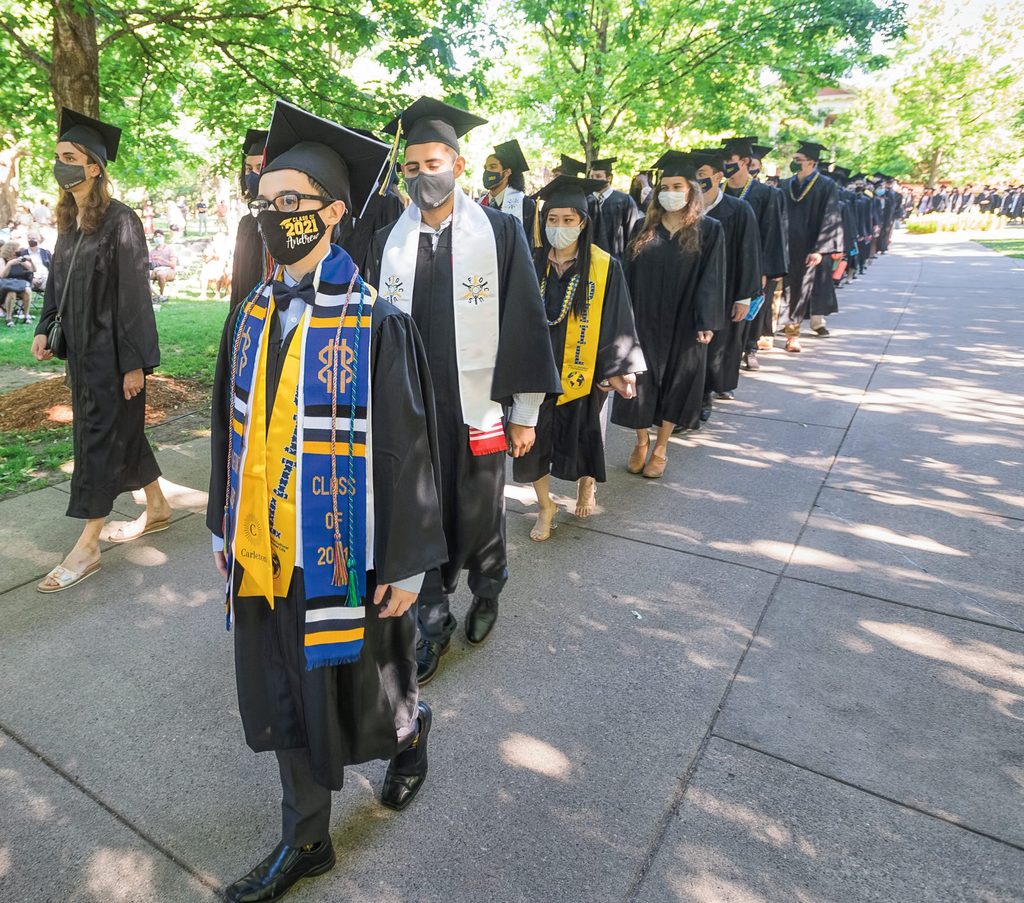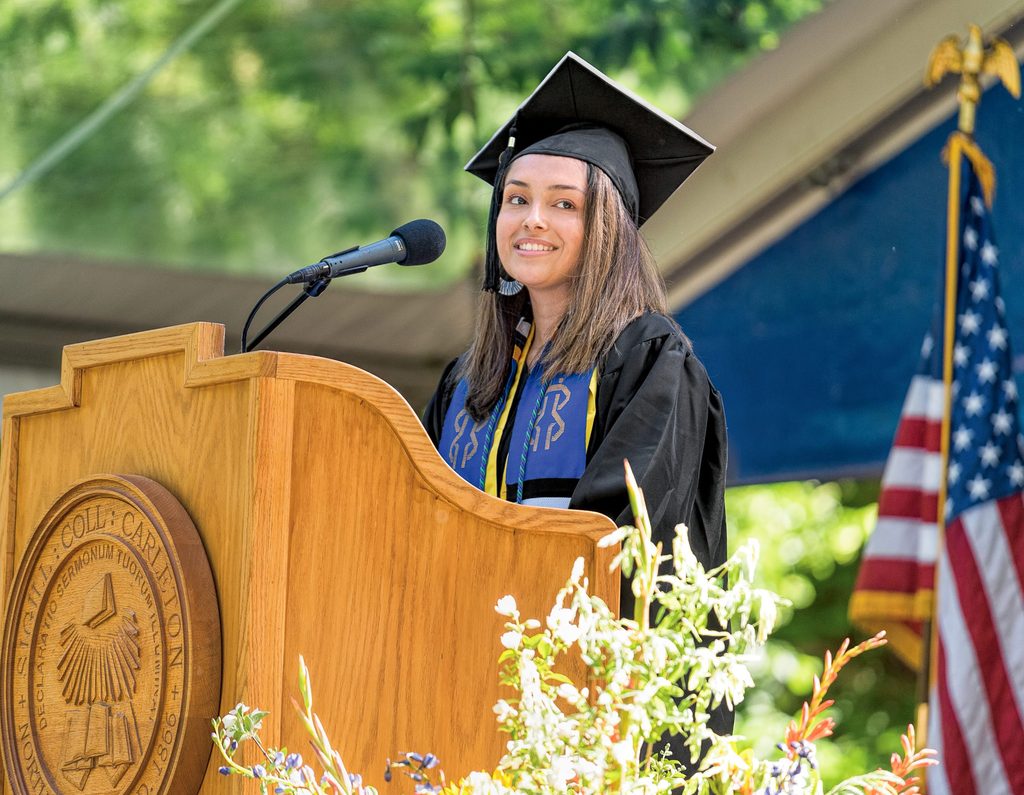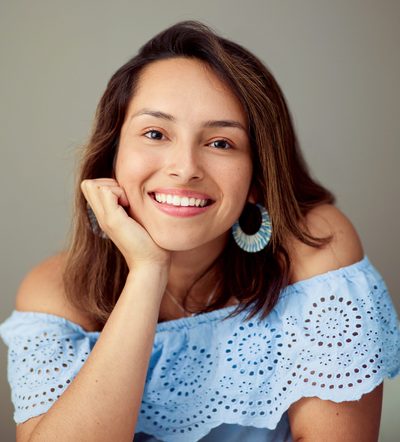
All commencement ceremonies at Carleton are special in their own right, though some surely stand out more than others.
That’s certainly true of this year’s commencement. At the last minute, operating under Center for Disease Control and Minnesota State Department of Health guidelines, Carleton determined that COVID-19 infection rates were low enough and vaccination rates were high enough that we could safely host the Class of 2021 and their loved ones at an in-person campus ceremony.
And yet, as grateful as we were to see our graduating seniors receive their diplomas on the Bald Spot, the moment was bittersweet as we remembered the toll the past 16 months had taken on so many, including our own students and alumni.
This year was also Steve Poskanzer’s last commencement as Carleton’s president. Poskanzer, who left his post in July, will take a year-long sabbatical before returning to Carleton as a professor in the political science department. In his remarks to the Class of 2021, he mentioned the important role they and all Carls played in the success of the past academic year.
“We are quite frankly awed by the genuine care and concern for others that suffused this entire academic year,” said Poskanzer. “This was evident in your mutual willingness to abide by a strict mask-wearing, physical-distancing community covenant; being subjected to repeated rounds of COVID tests; and enduring quarantine and isolation when necessary. I will ever believe that, notwithstanding the wonderful work of staff and faculty, our success in pulling off a strong academic year rests principally upon the responsible and mature attitude of Carleton students.”
Poskanzer acknowledged, as well, that 2021 was marked not only by a global pandemic, but also by increased attention to racial injustice and amplified calls for equality and equity across all facets of our society.
“Certainly, this last year has taught us all that we cannot predict or even imagine the vexing problems the world will throw at us. Nor can we be certain precisely how chronic issues such as entrenched inequality and racism will manifest themselves and call us with urgency to corrective action,” he said. “But we can and must ready ourselves to listen to the trumpet’s call and to draw upon our knowledge and energy to come closer to what we aspire to be and how we aspire to live.”
A few things were reassuringly familiar at this year’s ceremony: the stage in front of Hulings Hall, the maize and blue balloons, and the will-it or won’t-it threat of rain. As is also our tradition, a committee of students and faculty members selected a member of the graduating class to deliver a commencement speech. We were so moved by Brittany Dominguez’s reflection on the path that led her to Carleton and all the people who made her journey through the past four years memorable, that we have reprinted her speech in its entirety here.
Impact Valuable, and Necessary
A commencement speech by Brittany Dominguez ’21

In November of 2016, I got a phone call from Posse Houston, a scholarship foundation, that went something like this: “Brittany, this is Lauren from Posse Houston and I am calling to congratulate…” My smile is building and my heart beating a mile a minute “… you on becoming a finalist…” I am about to cry “… for Carleton College’s Posse…” And now I’m crying. No, not because I am overcome with joy, but because I just couldn’t imagine leaving home for a tiny town in the middle of nowhere Minnesota, where it dips below zero. However, as you can see, I ended up becoming a Posse scholar at Carleton and, while I was less than excited at the start of my Carleton journey, now, four years later, I know it was the best decision I have ever made.
Before coming to Carleton, I went out of my way to hide so much about myself. Why? Because so many of us learn that because of our skin color, immigration status, race, ethnicity, gender, socio-economic status, sexuality, or faith we are somehow less valuable. However, the truth is that those very identities that we are taught to hide and cover up out of fear of discrimination and judgment, those we have learned to consider our greatest weaknesses, are actually what make us so powerful, perceptive, and precious in spaces like this.
It took me coming to Carleton to recognize this for myself. My very first class here was Introduction to Sociology, and in week one of fall term, I found myself in Professor Annette Nierobisz’s office hours with a paper shaking in my hands. It was my very first college essay about the story of my name and, more than that, it was the first time I had written about the two moms who raised me, and thought about the insecurities I held about my ethno-racial identity. I was terrified because it felt like everyone around me knew things that I did not know, and to make it worse, now I had to write about a name and a family I had been hiding for years. Annette asked me to read my essay out loud, so I did, awaiting her disappointment with every word that rolled off of my tongue. However, to my surprise, she looked at me and said, “I love what you did with your story.” I lifted the corners of my mouth, and then we just talked about my family and what it meant to be a first-generation college student.
Our conversation reminded me of the value and importance of my name, my history, and the people who raised me. From there, I would go on to explore the sociological imagination, the roots of environmental tourism, the construct of the family, culturally relevant pedagogy, Latiné literature, and so much more, all while not only recognizing my limitations but also, for the first time, my unique and valuable insight. I say this because I want you to know that for all those times you question whether or not you belong, feeling like everyone else is smarter or better equipped, know that you bring something to that table that others cannot. Remind yourself daily that the same things that make you feel like an imposter are what actually make you important and necessary and valuable.
I say that knowing how hard it can be to do so — especially during the last year wherein we have not only experienced a pandemic, but also have witnessed grave injustices and violence against Black, brown, and Asian communities. However, if there is one thing the last year has taught me, it is to appreciate this place for the people. Think about your own Annette Nierobiszes, who perhaps unknowingly reminded you of your value. The Matt Rands, who opened their office on your best and worst days and had an endless supply of dad jokes to brighten your week. Don’t forget about the Tammi Shintres, who worked behind the scenes making sure you felt seen in your department. The Thabiti Willises, who knew how to energize an Education and Curriculum Committee meeting. The Liz Raleighs and Pamela Feldman-Savelsbergs, who told you never to apologize for being prepared and who always made the classroom or Zoom room a welcoming place for all who entered. The Dean [Carolyn] Livingstons, who listened to your endless flow of ideas; the Tammy Andersons, who held you tight when your gueli passed away; the Phoebe Wilmots, who always have a good story to share in Anderson; the Fernando Rosa Perezes and Deb Sunderlands, who stopped what they were doing to talk to you about their families and ask about yours; and the Constanza Ocampo-Raeders, who reminded you to see the strength and resilience in your culture and community. And please remember your Deborah Applemans, who taught you to always say the things that go without saying.

And, of course, you had those friends, your people who willingly stayed up until all hours of the night to vent, study, pray, sing, dance, cry, and laugh. Those who graduated before you, the Gifty Amoses, Dri Castilloses, Amie Bigirimanas, Gladys Corteses, and Funto Akindonases, who paved a path and helped you navigate it. Maybe you even had your own Andrew Farias to be the Andrew in your Brandrew — your best-friend-turned-brother.
Finally, there were those who came before Carleton. For me, it was my family. The two bad-ass women who raised me. The Momma Netty, who showed me the beauty of adventure. The Momma Gloria, who worked tirelessly day and night cleaning houses, taking care of kids and the elderly, working at donut shops, and cutting out wooden signs to make sure I could be here today. Momma only you and I know how tough it got, but in everything we went through from the early mornings and holey tires to the penny-pinching and at-home movie theaters, you taught me to think creatively and to always have faith in God. I have had an endless flow of love and support from arguably the best sister in the world; my dad, who I know is smiling in heaven today; my brothers, cousins, tios and tias, and the grandparents — especially the grandmas — who built it all.
Friends, all of this is to say that we are never alone and we are never worthless. Today, we have been granted a great deal of privilege. This is not to say that it has been easy as some of us will be the first in our families to walk this walk and many of us have overcome barrier after barrier to be here. Not to mention that the last year has not looked anything like we thought it would. However, we did it, and we have the opportunity and responsibility to use our privilege to actively fight against the hate, oppression, racism, and apathy ingrained in our systems.
Class of 2021, congratulations! I look forward to fighting alongside you and lifting you up as we work for a changed tomorrow, one where we can all wake up every day knowing just how important, valuable, and necessary we are.
